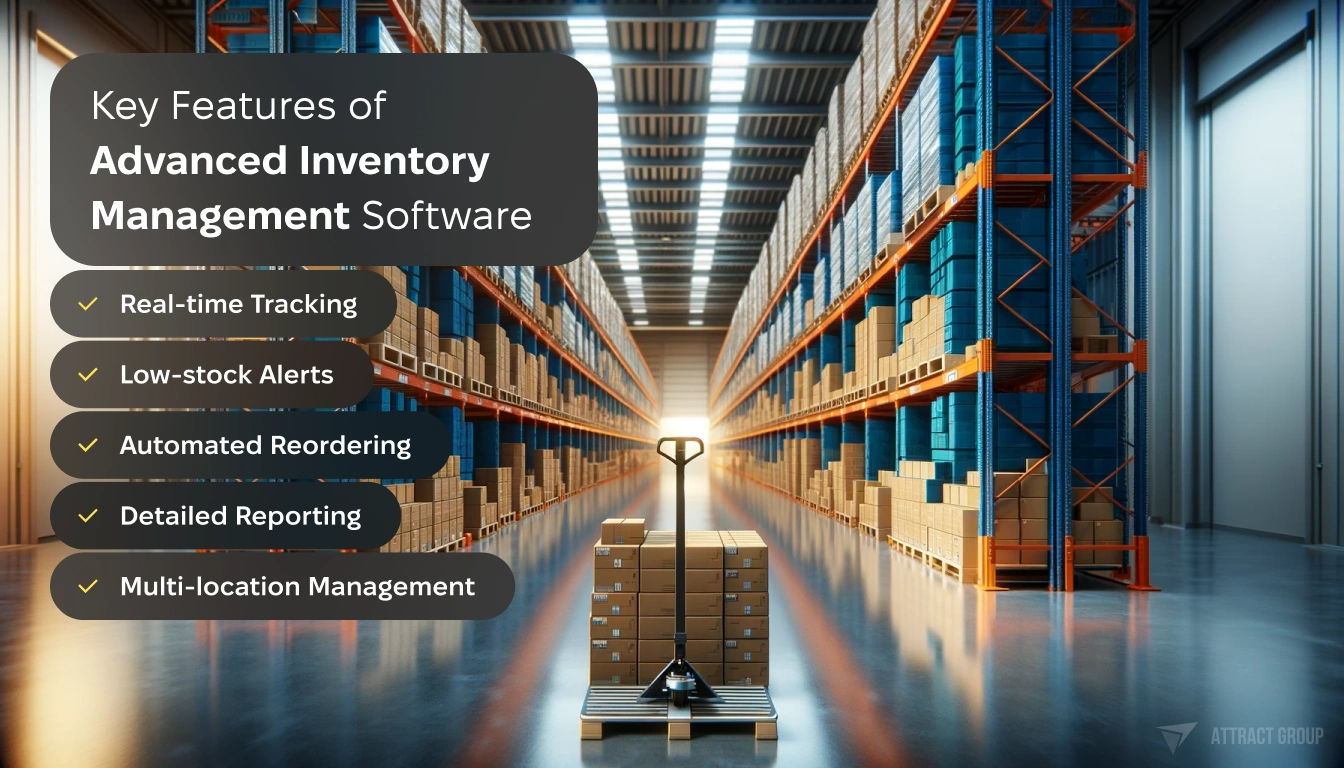Discover USA’s Leading Experts in Cutting-Edge Inventory Software Development
 12 January 2024
12 January 2024? Listen to the Summary of this article in Audio
Navigating the complex terrain of inventory management software development, American businesses seek state-of-the-art solutions to refine and optimize their supply chain operations. In the USA, where market demands and regulatory expectations vary widely across state lines, expert software development tailored to address these multifaceted requirements is not just advantageous but necessary. Such USA inventory system solutions not only streamline inventory control but also shape the backbone of a business’s capacity to adapt and thrive in a rapidly evolving commercial landscape.
Key Takeaways
- Customized inventory management software development is essential for the diverse landscape of American business practices.
- Adjustable USA inventory system solutions provide the precision needed to comply with varied state regulations and industry standards.
- Expert software development teams in the USA have the necessary skills to enhance business efficiency through specialized inventory software.
- Professional inventory management software plays a critical role in effectively scaling business operations.
- Intelligent inventory software solutions streamline operations, offering real-time analytics and data-driven insights.
- With the right inventory management software, businesses can foresee market trends and manage stock levels proactively.
An Overview of Inventory Management System Advancements
The landscape of inventory management has undergone a transformative shift in recent years, with inventory management system advancements redefining how businesses track, manage, and forecast their inventory. The advent of the latest inventory software technology has ushered in an era where automation, comprehensive integration, and real-time data are no longer aspirational features—they are industry standards that drive operational excellence.
Key to these advancements is the ability of modern inventory systems to extend their capabilities beyond simple stock counts. Today’s solutions encompass real-time tracking, digital labeling, barcode scanning, and an overarching consolidated control that aligns seamlessly with multifaceted business structures. This evolution directly combats formerly manual processes that were prone to error and inefficiency.

Integration plays a critical role in these technological leaps. By syncing with existing points of sale (POS) and accounting systems, inventory software minimizes redundancies and provides a unified view of inventory data. Equipped with such integrative tools, businesses can maximize their operational fluidity, translating to tangible improvements in their bottom line.
Amidst this progress, it is the breakthroughs in automation that perhaps most distinctly characterize the ongoing inventory software technology revolution. By automating core inventory management processes, companies can now anticipate needs, respond to demand fluctuations, and optimize stock levels with unprecedented precision.
“Efficient inventory management is the cornerstone of supply chain optimization. Leveraging the latest software technology not only streamlines operations but also provides a strategic advantage in a competitive marketplace.”
- Real-time Inventory Tracking: Offering businesses the means to monitor stock levels as changes occur, securing data integrity, and enabling agile responses.
- Digital Labeling and Barcode Scanning: Simplifying product identification and expediting inventory processes from receiving to sales.
- Consolidated Inventory Control: Empowering enterprises to manage stock across multiple locations through a single, comprehensive dashboard.
These features are no longer optional in today’s highly competitive environment. They are the foundation upon which smart inventory management is constructed — a foundation that is critical for businesses intent on keeping pace with the dizzying speed of market changes and consumer expectations. Indeed, the future of inventory management rests on continual innovation and technological agility, paving the way for complex yet intuitive systems that align with ever-evolving business realities.
The data speaks volumes:
| Advancement | Impact on Business |
|---|---|
| Integrated Inventory Control | Unified stock management and reduced process times |
| Automated Reordering | Optimized stock levels and reduced hold costs |
| Advanced Reporting | Insight-driven decision-making and performance tracking |
The pace at which inventory management system advancements are emerging signals an exciting time for businesses. With technological innovation at the helm, inventory systems are becoming not just tools of necessity but catalysts for growth and expansion. The way forward is clear: embrace the latest inventory software technology and hold a strategic advantage in a rapidly transforming digital economy.
Our experts can develop a tailored inventory management system aligned to your business’ unique processes and requirements.
The Critical Role of Inventory Management Software in Modern Business
In an era where efficiency is synonymous with success, the inventory management software role has become central to modern business operations. These inventory solutions are more than a luxury; they are an intricate part of daily activities, integrating deeply with core business operations to foster reliability and drive growth.
Integrating Inventory Software with Business Operations
Effective business operations integration is essential for companies looking to maintain a competitive edge. Inventory software seamlessly marries critical data with daily operations, resulting in a synergistic relationship where insights fuel actions and operational precision becomes the norm.

At the heart of this integration are software systems that not only centralize inventory data but also ensure its relevance and accessibility across various business departments. Real-time information flow is not a mere convenience; it is vital for making informed decisions in a fast-paced market. The integration of these systems consolidates disparate information streams, providing a single version of truth that is indispensable for coherent decision-making.
Benefits of Tailored Inventory Management Solutions
- Tailored inventory management solutions represent a strategic approach to addressing the unique challenges of a business. Customization translates to the software’s ability to ‘speak’ the language of the specific industry it serves.
- These solutions are adaptable, molding around existing processes and enhancing operational aspects like shipment tracking, inventory accuracy, and customer satisfaction through optimized delivery schedules.
- Benefits extend beyond operational to substantial financial gains. Companies enjoy significant cost savings by minimizing instances of understocking or overstocking. Additionally, they can avert potential losses due to shrinkage or supply chain disruptions.
Undoubtedly, such software development benefits are transformative, aligning businesses with the pace of modern commerce. As companies grow, their operations expand, and demands fluctuate, the flexibility of a custom software solution becomes ever more critical.
| Feature | Benefit |
|---|---|
| Real-time inventory updates | Ensures accurate stock levels and aids in the prevention of stockouts |
| Centralized data | Offers a comprehensive understanding of inventory across all locations |
| Automated reporting | Provides actionable insights that can drive informed decision-making |
| Custom alerts and notifications | Alerts businesses to critical inventory levels or delivery schedules |
“Investing in inventory management software is investing in the future competitiveness and agility of a business.”
Embracing custom software solutions in the realm of inventory management is not just about keeping up with technology; it’s about redefining the operational framework of a business to adapt and excel. The benefits of tailored inventory management solutions are clear — enhanced efficiency, superior customer service, and increased profitability. This trio of advantages stands as a testament to the indispensable nature of dedicated inventory software in today’s business landscape.
Leverage our inventory software integration to connect existing systems for efficient information flow.
Key Features of Advanced Inventory Management Software
Businesses seeking to elevate their inventory management tactics deploy advanced inventory management software, which encapsulates a suite of software features designed for precision and flexibility. These tools enable firms to quickly adjust to fluctuations in demand and maintain an effective supply chain.

Inventory software capabilities have burgeoned into sophisticated systems that deliver unparalleled control over stock levels and resource allocation. Demarcated by pivotal characteristics, these systems are central to achieving a seamless operational cadence.
- Real-time Tracking: Next-generation software offers the ability to monitor inventory levels as they shift, providing businesses with up-to-the-minute accuracy.
- Low-stock Alerts: Proactive alert systems notify personnel of declining stock, avoiding shortages and potential sales loss.
- Automated Reordering: Sophisticated algorithms within the software can gauge inventory needs and initiate purchase orders autonomously to maintain optimal stock levels.
- Detailed Reporting: An abundance of analytical data is at the users’ fingertips, enabling them to make informed decisions based on historical trends and current metrics.
- Multi-location Management: This feature supports businesses operating across several sites, producing a unified overview of inventory across all locations.
Advanced inventory management software has become an indispensable tool for businesses looking to optimize their supply chain and remain competitive in today’s fast-paced marketplace.
| Feature | Description | Benefit for Businesses |
|---|---|---|
| Real-time Tracking | Monitors and updates inventory levels instantly as transactions occur. | Allows for instantaneous decision-making and reduces the risk of stock discrepancies. |
| Low-stock Alerts | Automated notifications sent when stock levels fall below a pre-defined threshold. | Prevents stockouts by prompting timely reordering. |
| Automated Reordering | System-generated purchase orders based on inventory analysis. | Streamlines the procurement process and ensures continual stock availability. |
| Detailed Reporting | In-depth insights into sales performance, inventory turnover, and customer preferences. | Aids strategic planning and trend spotting for inventory optimization. |
| Multi-location Management | Capacity to track and control inventory across multiple warehouses or stores. | Consolidates data for simplified oversight and resource distribution. |
As economic dynamics evolve, so does the requirement for businesses to implement advanced inventory management software adept at supporting the nimble reconfiguration of inventory systems. By harnessing these key features, enterprises can not only streamline their day-to-day processes but also forecast future needs with heightened precision and efficiency.
Selecting the Right Inventory Management Software Development Company
For businesses in need of a comprehensive inventory management solution, the choice of an inventory software development company is a pivotal decision that can affect operational efficiency for years to come. An adept provider of software development services not only delivers a product but also understands and anticipates the needs of a business as it scales and navigates market changes.
Engaging with a company that has a robust track record in robust inventory system assessment and development is essential. The software must not only meet current requirements but also offer the scalability to adapt to future business growth and evolving supply chain demands.
Assessing Software Development Services for a Robust System
Finding the right partner for your inventory management needs involves a detailed analysis of prospective companies’ services. The following table outlines essential criteria for evaluating a potential software development partner for constructing a robust inventory management system.
| Assessment Criteria | Description | Importance for a Robust System |
|---|---|---|
| Customization Abilities | Capability to tailor software features to a business’s unique processes and requirements. | Critical for ensuring the software aligns with specific operational needs, providing long-term utility. |
| Integration Facilities | Seamless connection with existing or future digital ecosystems, including ERP and CRM systems. | Facilitates efficient information flow within all related business operations, essential for data consistency. |
| Scalability Features | Ability to grow with the business, handling increased transactions and inventory complexity. | Ensures the software continues to perform effectively as the business expands, avoiding costly system migrations. |
| Support and Maintenance | Quality and availability of customer support and regular software updates. | Prevents operational disruptions and guarantees the system evolves with current technologies and market trends. |
Selecting an inventory software development company with a portfolio reflecting these qualities is an excellent start. Companies should look for evidence of prior collaborations that required a high degree of customization, attention to integration capabilities, and a commitment to long-term client growth and support.
Partner with a software development service provider that not only understands your business model but also possesses the foresight to adapt your inventory management system to future imperatives.
- Investigate case studies and client testimonials to gauge the success and reliability of a software provider’s previous projects.
- Ensure the company understands compliance and regulatory requirements specific to your industry and region.
- Inquire about ongoing technical support, as well as training for your team to maximize the return on your software investment.
Ultimately, a judicious selection of a development company lays the foundation for a sustainable and robust inventory system that boosts overall business operations, directly impacting your company’s efficient performance and long-term strategic viability.

Custom Inventory Management Software: A Game-Changer for Businesses
As the digital ecosystem continues to expand, businesses across industries are seeking innovative solutions to streamline their operations. This quest for efficiency has led to the advent of custom inventory management software, becoming a game-changer in software development. These advanced systems are designed not just to solve inventory tracking challenges, but also to propel businesses towards unprecedented operational command and insightful analytics.
Implementing business inventory solutions that are customized to the intricate nuances of a particular company can lead to transformative outcomes. From scalability to integration with pre-existing architectures, every facet of the supply chain can be optimized to work harmoniously, elevating the potential and profitability of businesses looking to innovate their inventory practices.
Custom solutions grant businesses the flexibility to thrive in demanding markets by providing capabilities that off-the-shelf software simply can’t match. Tailored software interacts seamlessly with a company’s unique ecosystem of hardware and software tools, ensuring that every element from the storefront to the warehouse is operating at peak performance.
“Custom inventory management software not only aligns with your specific business model but also adapts to market evolution, offering unparalleled resilience and competitive advantage.”
- Seamless integration with existing systems and processes
- Adaptable analytics and reporting for actionable insights
- Personalized features and controls for various industry requirements
The customization journey begins with a comprehensive analysis of a business’s requirements, which then inform the development of a personalized inventory solution. The benefits of this approach are many fold:
| Custom Feature | Operational Benefit | Industry Impact |
|---|---|---|
| Real-Time Inventory Updates | Live stock level tracking mitigates risk of overstocking and understocking | Retailers can maintain optimal product availability |
| Intelligent Analytics | Strategic insights into inventory trends and consumer behavior | E-commerce platforms can tailor inventory to customer demands |
| Multi-platform Synchronization | Consistent inventory data across online and offline channels | Omni-channel sellers provide a seamless customer experience |
| Automated Alert System | Proactive notifications for reordering based on preset thresholds | Manufacturing can avoid production delays due to inventory shortages |
Distinguished by their ability to infuse agility into businesses, these game-changer software development projects are equipping companies to stay ahead in competitive markets. Adopting a system that understands the business language and enhances every step of the inventory management process is not just smart—it’s critical. By taking on custom software, companies are not just preparing for the present—they’re gearing up for a future where efficiency and optimization are the keys to triumph.
Exploring Cloud-based Inventory Management Systems
The dynamic realm of inventory management is increasingly steering toward cloud-based solutions, offering enterprises an arsenal of tools to manage their stock efficiently. As the demand for robust and scalable inventory control mounts, cloud-based inventory management systems stand out with their capacity for real-time inventory tracking and data accessibility across multiple devices and locations. Let’s delve into the advantages these systems bring to modern business operations and the considerations important for a successful migration to the cloud.

Advantages of Cloud Solutions for Real-time Inventory Tracking
One of the defining traits of cloud-based inventory management is the leverage it provides for real-time inventory tracking. Through this advanced capability, businesses gain immediate visibility into their inventory, helping to make swift and informed decisions. Here is a succinct list of cloud solutions advantages:
- Affords businesses the agility to manage inventory from anywhere, at any time
- Upgrades the efficiency of operations with instant updates and integrations
- Offers scalability to handle peak workloads and business growth seamlessly
- Enhances security with sophisticated back-ups and data recovery protocols
Businesses that employ cloud-based software reap the benefits of a system that is both flexible and sophisticated, ensuring streamlined management of their inventory.
“As the marketplace continues to evolve, cloud-based inventory management stands as a beacon of innovation, offering businesses the dexterity to adapt and succeed in an ever-changing environment.”
Key Considerations When Moving to the Cloud
Moving your inventory management into the cloud is a strategic operation that warrants careful thought and preparation. Here are some key cloud migration considerations for businesses contemplating this shift:
| Consideration | Why It Matters |
|---|---|
| Data Security | Ensure that sensitive inventory data is protected against breaches and loss. |
| System Interoperability | Facilitate seamless integration with existing systems for a unified operational approach. |
| Scalability | Choose a solution that can grow and adjust to the expanding needs of your business. |
| Customization Potential | Custom features can provide tailored solutions to fit specific business requirements. |
| Provider Reliability | Select a cloud service provider known for uptime reliability and robust support. |
When businesses carefully assess these factors, they position themselves to make the most out of inventory management in the cloud. A transition to a cloud-based system can translate into significant advantages, fortifying inventory management and business resilience for the long term.
Our custom inventory software solutions grow with your business needs to manage increased complexity.
Evaluating Warehouse Management Software for Optimal Inventory Control
When it comes to enhancing inventory efficiency, conducting an in-depth warehouse management software evaluation is imperative. Today’s businesses require software that exceeds standard functionalities to achieve optimal inventory control. This not only involves tracking the inflow and outflow of goods but also includes sophisticated features such as automated data aggregation, precise logistical tracking, and seamless ERP integrations.
It is through meticulous evaluations that businesses can determine which software provides the tools to meet their specific sector’s challenges, thereby augmenting their stock management strategies. An inventory software review serves as the conduit for companies to understand the depth and breadth of a software’s capabilities, ensuring that it can adapt to the dynamic nature of their operations.
Optimal warehouse management involves not just knowing the quantity of stock but understanding its movements, predicting its needs, and mitigating any risks that can lead to inefficiencies.
A comprehensive review of warehouse management solutions must underscore the pivotal features that align with an organization’s goals. Below is a detailed analysis of essential components that contribute to a robust inventory control system:
| Feature | Functionality | Benefit |
|---|---|---|
| Automated Data Aggregation | Gathers and synthesizes information from various sources within the warehouse ecosystem. | Provides a unified data pool, enabling strategic decisions based on comprehensive insights. |
| Logistical Tracking | Tracks goods throughout the entire logistic chain, from inbound to outbound processes. | Ensures timely and accurate movement of goods, minimizing delays and enhancing customer satisfaction. |
| ERP Integration | Seamlessly communicates with Enterprise Resource Planning systems, merging inventory with business functions. | Facilitates a holistic approach to resource management, aligning inventory with financial and operational planning. |
As the evaluation criteria showcase, the efficacy of warehouse management software is significantly marked by its capacity to fortify the integrity of stock management. By utilizing these sophisticated features, businesses can skirt the perils of manual mismanagement and ascend to greater heights in warehouse and inventory efficiency.
- Warehouse software should afford agile responses to demand fluctuations and supply chain uncertainties.
- Advanced reporting is crucial, converting raw data into strategic business intelligence.
- Real-time access to inventory levels ensures that businesses can maintain service levels and manage resources efficiently.
Ultimately, the intricacies of a successful warehouse management system lie in its flexibility and technological prowess. Software that encapsulates these advanced features propels businesses toward achieving optimal inventory control and establishing a competitive edge in the marketplace. An effective warehouse management software evaluation is the cornerstone to unlocking these benefits and navigating the complexities of supply chain management.
The Future of Inventory Management: AI and Machine Learning Innovations
The paradigm of inventory management is evolving at an accelerated pace, with AI innovations and machine learning in inventory systems leading the charge. As businesses confront the complexity of modern supply chains and consumer demand, the integration of intelligent technologies within inventory systems is becoming imperative for future success. Advanced AI tools are increasingly important for anticipating purchasing patterns, automating essential stock management protocols, and delivering accurate, strategic insights into inventory control.

One of the most striking contributions of machine learning to inventory management is its predictive capability. By analyzing vast quantities of historical data, these systems identify trends and anticipate future demand with a high degree of accuracy. This is particularly valuable in preventing stockouts, managing lead times, and optimizing stock levels, ensuring that businesses maintain continuity in their operations.
Utilizing AI in inventory management not only improves operational efficiencies but is fundamentally reshaping the very constructs of supply chain logistics and strategy.
- Automated reordering processes significantly reduce the manual workload associated with maintaining appropriate stock levels.
- AI-powered forecasting models can discern complex patterns that human analysis might overlook, leading to better stock optimization.
- Repetitive and time-intensive tasks, once prone to human error, are now executed with precision by advanced algorithms.
In this rapidly evolving tech landscape, businesses must stay abreast of the latest developments in inventory management future trends, recognizing the immense potential that AI and machine learning technologies hold. Embracing these innovations is key to achieving a competitive edge and driving the strategic aspect of inventory control to new heights.
Key Benefits of AI and Machine Learning in Inventory Management
| Technology Application | AI Innovations | Machine Learning Impact |
|---|---|---|
| Predictive Analytics | Able to forecast demand with greater accuracy | Enhances decision-making with data-driven insights |
| Automated Reordering | Minimizes stockouts with timely procurement | Streamlines supply chain with efficient order management |
| Task Automation | Reduces the scope of manual errors | Improves overall operational efficiency |
| Data Analysis | Identifies nuanced trends and relationships in inventory data | Adapts processes in real-time for optimal inventory levels |
Undeniably, artificial intelligence and machine learning are rewriting the rules of inventory management. By refining algorithms and expanding the capabilities of inventory systems, businesses are attaining greater efficiency and cultivating a proactive stance towards inventory challenges. These innovations are not just fleeting trends but the cornerstones upon which the sophisticated inventory management practices of tomorrow are being built.
Cost Analysis: Investment in Expert Inventory Management Software
When it comes to deploying inventory management systems, businesses must navigate a landscape of diverse investment options and potential returns. The financial commitment to inventory software involves a critical evaluation of how such investments will affect the bottom line and foster organizational growth over time.
Understanding the ROI on Inventory Management Systems
Conducting a thorough inventory software cost analysis provides businesses with a clear view of the expenditure versus the gains obtained from implementing such systems. Harnessing the power of sophisticated inventory software is an invaluable asset to modern inventory practices, driving improvements that resonate across various facets of operation—from increased accuracy in stock levels to enhanced customer satisfaction. This, in itself, heralds significant returns on software investment.
A judicious approach to understanding the ROI on inventory systems spans several critical areas:
- Operational Efficiency: Reducing manual entry and automating routine tasks.
- Error Reduction: Curtailing the possibility of human-made inaccuracies characteristic of manual inventory management.
- Growth Facilitation: Equipping businesses with the ability to scale without the need to frequently overhaul existing systems.
These considerations, when weighed against the investment, demystify the true cost impinged by software development and its subsequent return for a business. An astute assessment can shed light on how investing in the right inventory management software can be a game-changing move for organizations seeking to refine their operational capabilities.
| Software Features | Operational Benefits | Impact on ROI |
|---|---|---|
| Automated Data Entry | Lowers manpower costs and reduces errors. | Positive impact through savings on resources and improved data reliability. |
| Real-time Analytics | Swift decision-making based on accurate inventory insights. | Gains from informed purchasing and stock level optimization. |
| Scalability Provisions | Adapts to growing business demands without significant system changes. | Avoidance of additional investment due to scalable design. |
| Integration With Other Systems | Creates a seamless ecosystem reducing operational silos. | Long-term return with a unified infrastructure reducing the need for multiple systems. |
Investing in inventory management software transcends simple cost calculations; it’s a strategic move that yields dividends by enhancing operational excellence and competitive edge.
Ultimately, an insightful ROI analysis articulates that while upfront costs of inventory software can be substantial, the long-term savings, efficiencies, and growth potential far outweigh initial expenditures. Hence, businesses striving for agility and sustainability cannot overlook the indispensable role that expert inventory management software plays in their quest for market leadership and operational effectiveness.

Conclusion
The journey through the intricate world of inventory management software underscores its indispensability in the modern business framework. Expertly developed systems stand as the bedrock of inventory optimization, catalyzing operational agility, and providing the financial finesse necessary to thrive in competitive markets. From the integration of groundbreaking AI and machine learning technologies to the implementation of cloud-based systems, efficient software solutions have proven to be invaluable for businesses aiming to navigate the complexities of inventory control with proficiency.
As we encapsulate the insights gleaned from our exploration, it is clear that the right software serves as a strategic asset, one that bolsters a business’s capability to manage its inventory with unparalleled precision. The inventory management software conclusion is unequivocal: harnessing such technology is not merely a choice but a requisite for companies intent on maintaining relevance and efficiency. This is particularly true in the milieu of the United States, where the diversity of state regulations and the rapidity of market evolution demand nothing short of excellence in inventory practices.
Connect with our experts to develop custom inventory management solutions for your business needs.
In summary, the alignment of a robust inventory management software development company with your unique business requirements can make a world of difference. Foresight, customization, and a commitment to growth are the hallmarks of a partner that can facilitate your journey towards thorough inventory optimization. Thus, in the quest for operational preeminence, investing in these technological harbors of efficiency is the keystone to unlocking the full potential of your enterprise.
FAQ
What are the primary benefits of expert inventory management software development in the USA?
The key benefits include creating customized, efficient inventory system solutions that cater to unique business needs, ensuring compliance with various state regulations, and providing tailored services to enhance operational efficiency for industries ranging from retail to manufacturing.
How have inventory management systems advanced in recent years?
Recent advancements have integrated automation and real-time tracking into inventory management systems, including digital labeling, barcode scanning, and enhanced coordination with POS and accounting systems for heightened operational fluidity.
Why is inventory management software critical to modern business operations?
Inventory management software is crucial for automating stock updates, tracking inventory levels across multiple locations, and integrating with sales and procurement processes, which helps in informed decision-making and maintaining operational finesse in the business.
What makes advanced inventory management software stand out?
Advanced software is characterized by features like real-time inventory tracking, automated reordering, low-stock alerts, comprehensive reporting, and the ability to manage inventory across various locations to accommodate dynamic supply chain demands.
How do you select the right inventory management software development company?
It’s important to consider the company’s ability to deliver scalable, integrative, and customizable solutions that can grow with the business and adapt to market changes. Look for a development partner with a strong track record and relevant expertise.
What is the impact of custom inventory management software on businesses?
Custom inventory management software acts as a game-changer by offering tailored solutions that integrate seamlessly with current hardware and software, provide insightful analytics, and revolutionize inventory practices regardless of industry size or type.
What are the advantages of cloud-based inventory management systems?
Cloud-based systems offer advantages of accessible, real-time inventory tracking across various devices and locations, secure data management, instant updates, and the flexibility to handle modern inventory management requirements effectively.
What should be considered when transitioning to cloud-based inventory solutions?
When moving to the cloud, factors like data security, system interoperability, and scalability should be considered. Evaluating potential for customization and selecting the right cloud service providers are also essential for a successful transition.
How do you evaluate warehouse management software for optimal inventory control?
Evaluation should focus on the capability to automatically aggregate data, track logistics proficiently, and integrate with ERP systems. The ideal warehouse software is one that adapts to specific sector challenges and improves overall inventory management.
What is the future of inventory management, and how will AI and machine learning play a part?
AI and machine learning are poised to further transform inventory management by forecasting purchasing trends, automating reordering to avoid stockouts, and executing repetitive tasks more effectively, thus enhancing strategic inventory control practices.
How can I understand the return on investment for inventory management software?
To understand the ROI, analyze the software’s impact on enhancing operational efficiency, reducing errors, and its capability to promote growth without the frequent need for system upgrades. Cost considerations should also factor in the overall value brought to the business.









